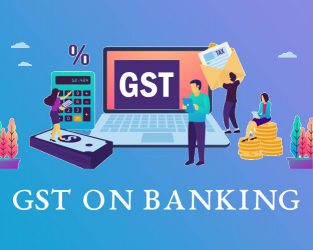Article Content:
- Increase in Compliance
- Input Tax Credit leveraged and de-leveraged
- Assessment and Adjudication will create some issues
- Problems related to revenue recognition under GST
- Financial Services Related to Account
- Paying GST at Applicable Rate
- Actionable Claims
- Problems related to services under GST
- Potential benefits of GST
GST is impacting every business sector in the country including the service sector. The impact of GST on the financial services sector will depend on the rate of GST fixed by the GST Council.
If the rate of GST is higher than the present rate of service tax, it will negatively affect customers and all services of the bank will become expensive. The financial services sector specifically, financial services based on funds and insurances, (Non-Banking Financial Company) NBFCs and banks are most affected.
Increase in Compliance
Almost every bank and NBFC has a multi-state presence and under the GST tax regime, they have to pay taxes at the states as well as at the centre level. Hence, banks and NBFC need to obtain registration for every state where they are operating. To maintain all these, they need separate books for each separate branch to create effective control over their usage and unused input tax credit. Performing intra-state and inter-state transactions can also become a problem for the bank.
This will substantially lead to an increase in compliance levels due to the rise of registration under service tax.
Input Tax Credit leveraged and de-leveraged
Banks and NBFCs currently opt for reversal of 50% credit under the CENVAT credit against inputs and input services and CENVAT credit has no reverse condition on capital goods.
In GST banks and NBFCs can avail 50% credit under the CENVAT credit against inputs and input services. Capital goods are reversed which reduces the credit of 50% on capital goods, due to which the cost of capital went up.
Assessment and Adjudication will create some issues.
Due to registration of all locations, all the banks and NBFCs need to register for all office locations. Due to an increase in accounting and other procedures, most of them will face a lot of problems that can complicate the payment of taxes under the GST regime. All critical assessments will be carried out under which the respective banks and NBFCs are registered and they need to justify using the input tax credit for the respective state. The imminent authority under GST will increase and this will create some issues as they have some differences or a new approach for similar old problems.
Problems related to revenue recognition under GST
Banks and NBFCs will have to face many problems related to revenue recognition as most of their services are related to different sectors and segments, some of which are mentioned below.
Financial Services Related to Account
In the era of digitalization and centralization, anyone such as professionals, manufacturers, businessmen and others can get different services anywhere in India, and there can be a high probability that they will shift to a new location. This will cause problems due to a different address. On the other hand, branches provide many services related to payment and other goods, within states and outside the states, to determine the location where these services are provided will not be an easy task.
Financial Services not Related to Account
Providing financial services to those who are running a business from a remote area and managing a bank account from another location. Also, will cause some problems because the location of the service provider is different from the operator location.
Paying GST at Applicable Rate
With GST, services are expected to attract more tax compared to the current service tax rate. This may make their services like issue of cheque books and loan processing more expensive compared to previous times.
Actionable Claims
Actionable claims do not allow under service tax, meaning that no action can be claimed under the old tax regime. In GST the new tax regime, action claims are allowed and include the supply of goods, hence from bills discounted to securitization will come under the tax.
Problems related to services under GST
There are many services provided by banks and NBFCs which will be impacted with the implementation of GST, some of the services are.
- Loan: Loan being money to money transaction, is not subject to GST. Moreover, the interest that is to be charged on loans is also exempted from GST.
- Lease: Lease, in financial sectors, can either be a supply of services (transfer of the right to use goods for cash, deferred payment, etc.) or supply of goods (transfer of title in goods), which will attract GST at the rate similar to assets that are leased out.
- Hire Purchase: Hire purchase transaction includes a hirer providing an asset for use on hire rental basis and a right to acquire that asset at the end of the hiring tenure at a nominal rate. Therefore, this transaction will be done at the same rate at which the property is taken on rent under GST.
Potential benefits of GST:
- Smooth credit mechanism by reducing the cascading effect of many indirect taxes.
- Expansion of tax base with reduction of exemptions/concessions.
- Creation of a unified common market.
- Simplified/Value Compliance and Administration across India.
With the implication of GST on the financial sector, its impact on banks and NBFCs will require a complete rethinking of its operations, accounting, compliance and transactions. Besides, the IT system has to be vigilant enough to resolve the complexities related to GST procedures and high volumes of compliance.




















